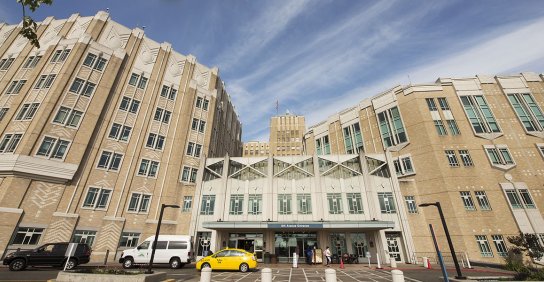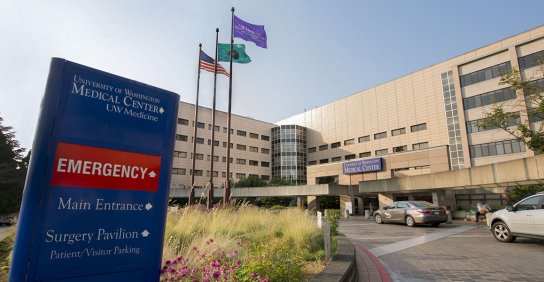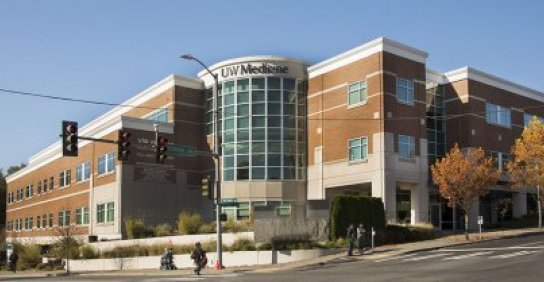For clinic appointments, visit the Regional Epilepsy Center in the West Clinic, 4th Floor, 325 9th Ave., Seattle, WA 98104; for EEG and neuropsychological testing, visit the Center Tower, 3rd floor.
Epilepsy and Seizure Care
Learn how our nationally recognized specialists help people with epilepsy find freedom from seizures — and a new lease on life.
Epilepsy and Seizure Care
Learn how our nationally recognized specialists help people with epilepsy find freedom from seizures — and a new lease on life.

Exceptional epilepsy expertise
If you’ve had one or more seizures and want to gain control of your condition, UW Medicine can help. Our specialists will determine which medications will prevent your seizures with the fewest side effects. And for the 30% of people whose seizures don’t respond to medicine, we offer surgery and implantable devices.
A higher standard of epilepsy treatment and support
We're home to a nationally recognized Level 4 epilepsy center, accredited by the National Association of Epilepsy Centers, that’s staffed by board-certified neurologists with advanced training in epilepsy care (epileptologists). This designation confirms we provide the highest level of care available for seizure disorders.
Our multidisciplinary team works closely together to provide holistic care. The team of specialists includes neurosurgeons, neuroradiologists and neuropsychologists as well as nurses, social workers, vocational rehabilitation specialists, and electrodiagnostic technicians to diagnose and treat difficult seizure problems.

Patient story
Life-changing epilepsy surgery for one mom
Melissa says her life was transformed after a lifetime of epilepsy. She journeyed from Vancouver, Washington, to Seattle for surgery and has been seizure-free ever since.
Epilepsy conditions and seizures we treat
Not everyone who has a seizure has epilepsy. That’s because some seizures are caused by factors such as low blood sugar or a sudden high fever. These are known as provoked seizures.
Unprovoked seizures are those that occur spontaneously and repeatedly. In most cases, someone who has two or more unprovoked seizures is considered to have epilepsy. This means their seizures are caused by abnormal or disruptive electrical activity in the brain.
We evaluate and treat a wide range of seizures and seizure disorders, including:
First-time seizures
Experts in our First Seizure Clinic can confirm whether your seizure was provoked or unprovoked and teach you what to do if you have a second seizure after your immediate symptoms have been triaged by an emergency medical team or medical provider.
Generalized epilepsy
With generalized epilepsy, which is sometimes genetic, seizures affect both parts of your brain at the same time.
Focal epilepsy
Focal (sometimes called “partial”) epilepsy involves seizures that begin in a localized region of the brain.
Refractory epilepsy
Up to one-third of people with epilepsy can’t control their seizures with medicine and need advanced treatment. This is known as refractory, intractable or drug-resistant epilepsy.
Get the facts about epilepsy and seizure symptoms
UW Medicine Regional Epilepsy Center
We offer epilepsy and seizure care at four UW Medicine locations.

Harborview Medical Center

UW Medical Center – Montlake
For clinic appointments, visit the Neurology Clinic in the main hospital, 1959 NE Pacific St., 8th Floor, Seattle, WA 98195.

UW Medicine Eastside Specialty Center
For clinic appointments, visit the Neurology Clinic, 3100 Northup Way, Bellevue, WA 98004.

UW Medicine Specialty Care at Meridian Pavilion
For clinic appointments, visit the Neurology Clinic, 11011 Meridian Ave. N., Suite 201, Seattle, WA 98133.
-
Routine EEG testing
-
Ambulatory EEG
-
Inpatient epilepsy monitoring
-
Intracranial EEG testing
-
Laser ablation
-
Resective neurosurgery
-
Medication management
-
Neuroradiology including 3T MRI, and PET scanning
-
Responsive neurostimulation (RNS) and thalamic neurostimulation (Medtronic)
-
ROSA® robotic-assisted surgery
-
Telemedicine visits available
-
Vagus nerve stimulation (VNS)
-
Neuropsychological testing
Patient resources and support

MyChart patient portal
Schedule and manage appointments, pay bills and see test results with MyChart, our online patient portal.

Telemedicine visits
We bring your UW Medicine epilepsy neurologist or neurosurgeon to you by secure video, from the comfort of your own home. These telemedicine visits are for non-emergent and follow-up care.